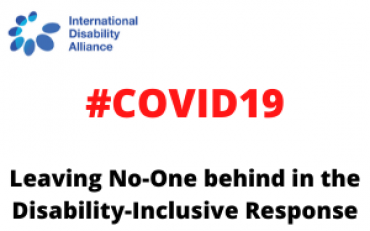This is one story as part of the Voices of People with Disabilities during COVID19 Outbreak series
Names have been changed to protect the individuals mentioned in the story.
This story is based on the testimonies shared with IDA by a person with psychosocial disability from Nepal. Names have been changed to protect security and privacy of individuals.
I am Bishwa from Nepal. About 5 years ago KOSHISH, an agency focused on psychosocial support, rescued me from the streets. Before that I was a human trafficking victim. I was sold to traffickers when I was just 4 years old and have been on my own ever since I managed to escape the traffickers at age 10. Although I have faced many difficult times in my life, I never broke down. But now I am facing a new kind of threat.
As a person with a psychosocial disability, the Coronavirus outbreak has threatened my slow but steady recovery for which I have worked hard.
Every passing day I work hard and follow a plan so that peoples’ insulting comments do not provoke me. I regularly keep up with my psychosocial therapies. But my progress is now failing. The phobia and stigma that I experience from COVID-19 is more dangerous than the virus itself. Maybe it’s hard for some people to understand, but those of us who have psychosocial disabilities struggle as if the virus was our fault.
Right now, I am struggling just to write what I am going through.
I am thinking of other people with psychosocial disabilities who are not as fortunate as I am to receive psychosocial support.” My heart breaks for them. If I cannot cope with the added pressure of COVID-19, then I can only imagine the situation of thousands with psychosocial disability in the rural and remote areas of Nepal.
How am I suffering? Inside, I am very sad, hurt, fearful, nervous, anxious and frustrated with myself and the Coronavirus. Every day is like this. I’m unable to concentrate on anything because I fear that I might not be able to cope. From the outside, the community that I live in instills fear into me more with every passing day.
For example, when I go to purchase groceries the shopkeeper who knows that I have psychosocial disability insultingly counts the money that I pay him twice and does not allow me to pick up the groceries myself. The shopkeeper would rather take the list of groceries from me, retrieve and bag them, then send me off with it, as if I am a child. I wonder where is the dignity of the purchaser in this?
When I visit the drugstore to purchase medication, the technician is patronizingly rude because I purchase stigmatizing medications for my condition. He also wonders if I have the virus and am hiding my infection by seeking medications for the virus as well as my mental health challenges. Apparently, it is presumed that those purchasing medicine for mental health conditions would as well purchase medicines for COVID-19.
Then there are those who try to fix me. Just a few hours ago, my neighbor a mother of three and a tailor by profession, asked me whether or not I need medications at all. She assumed that I am a sinner and should do penance rather than seek medication for my mental health condition. She was also afraid that I might infect her children with psychosocial or, by assumption, Coronavirus.
I’m discouraged. What happened to the positive impact of the awareness and sensitization drives that we conducted for so many years? It’s like it all vanished suddenly. Due to the Coronavirus threat our fearful society has reverted back to its traditional errors including the taboos regarding the psychosocial disability.
Why is this happening? It’s because our communities and broader society are so petrified of COVID-19 that they refuse to accept any theory or solution that challenges their traditional beliefs and cultural norms. In Nepal people believe that persons with mental health conditions are involved in one form or another of witchcraft. As a result, their deteriorating mental health is due to the sins committed by them in this life or in previous lifetimes through reincarnation.
With medication and psychosocial therapy, I can function well in society. Some persons presumed to have “severe mental health conditions” are not even allowed to participate in the various socioeconomic transactions. But the United Nations Convention on the Rights of Persons with Disabilities mandates that all persons with disabilities are important members of society and that they should not be rejected or excluded from enjoying common opportunities in their lives.
It seems like all these hard-won laws and policies have failed completely with the onset of COVID-19. Unlike other disabilities, baring the label of psychosocial disability has the added disadvantage that it strikes at our capacity to make decisions. Consequently, it also threatens our legal rights.
The Coronavirus scares me, not only because of its capacity to kill, but also because it brings damaging social ramifications, primarily the stigma attached to it in society. People are suspicious that because I have a psychosocial disability then I must be carrying COVID-19 virus either on me or in my personal items. People like me with psychosocial disability are already hurt by stigma in the society. This additional stigma further damages my mental health.
I have struggled with social, political, and financial isolation all throughout my life journey. But due to COVID-19 I must to go through all this again, in some ways, even worse.

